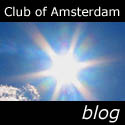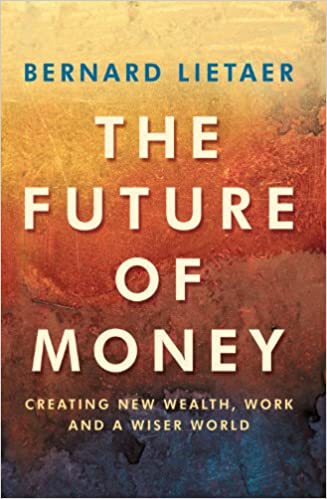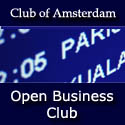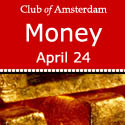
Welcome to the Club of Amsterdam Journal.
But isn’t scarcity absolutely fundamental to economics, especially in a world of limited resources? “My analysis of this question is based on the work of Carl Gustav Jung because he is the only one with a theoretical framework for collective psychology, and money is fundamentally a phenomenon of collective psychology.” – Bernard Lietaer, economist and author
Join us at the future of Money – Thursday, April 24, 2008
Where: Museum de Burcht van Berlage, Henri Polaklaan 9, 1018 CP Amsterdam [near Artis Zoo]
Felix Bopp, editor-in-chief
The Economic Storm
| About transformations to a Network economy The storm is a metaphor for the changes happening in our world. Changes with impact and results that are incalculable. They are also happening within the economic world. Many of our old patterns have had their longest time. We are richer than ever and have more capabilities than ever. But the consequences of this growth in our world are slowly but unmistakeably felt by everyone. Thankfully storms settle down and give new energy and chances. Martijn Aslander knows what the possible consequenses are. Martijn, who lives off networking and connecting people, is involved in more than a 1000 projects on yearly bases. He does this by following his heart. He turns all the available information technology into value for himself and others. His attitude to life is best described by the scouting law which he learned at an early age. A scout goes into the world with the other to discover this world and make it a better place to live in. He is honest, loyal and never gives up.He is economical and sober. He is a go-getter, cares for nature and respects himself and the other. You can definitely count on him. The economy is the sum of all the transactions and barter mechanisms that keep our society in place. Untill now the focus has been on collecting as much profit and capital goods as possible. But now that seems to be changing. We seem to be asking ourselves whether more money is needed, useful or valuable. On account of frequent usage of scarce resources, striving towards maximum profit often fails. Also companies have the tendency to waste the talent of many people. The well known rat race in which employees carry out their limited tasks day after day, restricts the enormous worth that people could actually bring into the economy. Martijn quotes futurologist and trend watcher Justien Marseille by stating that our society is making a jump from maximisation of profit to one of maximising usefulness. This simply means that you do the thing which you are good in, in the place at that given time which makes for optimal worth. Talent as an important impulse for the economy, that’s new. How is it possible that individual talent suddenly has the room to grow? Until now, we were restricted by means only available to organisations to be able to produce. This was certainly true when our economy relied on agriculture. With the coming of mechanisation and industry, this became more amplified. Later, when the computerization was a fact, it brought us the home computer and the internet. After this, the individual had meaningful tools at their disposal. With the home computer, everyone is able to write their own book, produce a movie or compose their own music. And the internet is our direct link to the whole world and thus the market. At the same time, the costs decrease so fast that everyone can join in to show their talent and offer their products. Experiment This development gives us the freedom to ask ourselves what on earth we are doing. And whether we might actually want to do it differently. There are still so many people that are not satisfied with what they are doing. Information technology gives us the opportunity to do things that were impossible in the past. Dependent on our talent we seek and find the necessary knowledge, information and contacts on the internet. This leads to an economy driven by networks instead of companies. And money does not seem to play the biggest role. The new barter system seems to be one of talent, knowledge and information. Critics say it’s impossible to make a living this way. So Martijn decided to test this theory and take on the experiment of not asking any money for his work. Soon he found that he either had a lot of money or hardly any money at all. But he always had just what he needed that at his disposal just. A computer, an overall subscription to public transportation, insurance, an office and indeed just plain money. Because if you can offer something that is valuable to many, then people are more than willing to donate in order to keep it coming. Martijn let go of all pretences and trusted that he would be fulfilled in all his needs at all times. Seeing this was a success; he began thinking of what we really need in this world. Evolutional movement The answer that he found is not directly a logical one. What we really need according to him is movement. Evolution makes us constantly adapt to our environment. And adapting means movement. With those kinds of dynamics our nature makes us search for ways to do things in a different but foremost better way. It makes us want to learn, to try, to create and to innovate. A natural process which unfortunately is discouraged in our present school system. While the bigger problems in our society – social cohesion, innovation, care system, education, competition with other countries like China and India – scream for our capacity to adapt. How this natural movement can be started is something Martijn knows all about. Every year he organizes a large festival in the woods in Drenthe, a province in the Netherlands. In three days a whole village is built where people can even pay electronically. While normally a festival of this scale would cost a couple of hundred thousand euros, Martijn and his enthusiastic and talented crew do it for less than 12.000 euros. And no script is even used. The circumstances in which this project can develop is mainly dependent on something Martijn calls swarming. A varied and motivated group gets together for a certain project. From within their own skill, everybody participates a little which means that the pressure all round is kept low. Because of the joint exchanges everybody learns from everybody. And after the project is over, everyone goes their own way again or starts on the next project. Super functional cooperation What is happening is, it’s using the network as a business. It groups together around a certain project and organizes that which needs to be organized. Then afterwards, it falls apart again. At first glance it seems more chaotic than businesses as we know it now. However, nature knows only how to use this form of non-organization also called the organic fluid pattern. A swarm of birds, a school of fish, a termite hill, these are all examples of a super functional cooperation in subtle tuning with each other. It is this coherence that spontaneously comes up in a network driven by a mutual goal. The internet and the ease with which like-minded people know how to find each other, makes people act as one organism, one species working together on this planet more than ever before. Web 2.0 Martijn is an insider when it comes to the technology used within the network economy known as Web2.0. This is the term used for a collection of useful tools which the internet offers for free. Tools for project management, file-exchange, marketing, information sharing. The sourcecode for these tools is accessible to everyone (open source). The unwrittenrule in the open source community that is Web 2.0 is that in exchange for using the tools, you have to make your own improvements and adaptations available under the same conditions. A much talked about example is the online encyclopaedia Wikipedia: it’s content is freely accessible to anyone and everyone can contribute. The accuracy of Wikipedia is nearly on the same level as the renowned Britannica Encyclopaedia. And the number of topics is many times larger. Small contributions by a large group of enthusiastic users make for the open source mentality in which products become better and extend fast. See the power of the economic network grow. The Holy Trinity of Dynamics is the term used by Martijn to describe this. It describes a new consciousness of information. Ideas are important.We already knew this. Also the connections between people are important. But information is the key between the ideas and the people. With information you pull people towards you. Information is necessary to create an idea, to carry it out and to talk about it with others. Consciousness about information in our society has not yet taken a leading role. We have to be nice Besides the technological tools that are available to make the most of the network economy, there are some personality traits that come in handy. Martijn mentions a fast working and flexible mind, an open attitude, curiosity and courage / guts. And the most important part of all, is being nice. He realises that you need the other as much as he needs you. The distant sound of the hippies can be heard in his approach. “I still have a bone to pick with them” Martijn says jokingly. Their enthusiasm and ideas appeal to him a lot. They just didn’t have the means to execute them. Martijn does. And that he has a point is something you see for example in the opinion of the Belgian top economist Bernard Lietaer. This great thinker is a true believer in complementary economies, where regional currency and bartering play a central role. To rely on a monetary economy alone is much too instable. A disaster like the one of 9/11 makes the dollar collapse and looses our faith in the economy. While it says nothing about the productivity or creativity of people. The revival of true value is the core of the network economy. Besides, says Martijn, a monetary economy can only grow by locking your money away in a bank so interest can be collected on it. Social capital on the other hand grows when you give it away and share it freely with others. Information is the new currency It is an interesting thought that giving leads to growth. You can only spend money once. Then it is gone. Ideas, information and access to your network are something you can give away over and over again without loosing anything. The reverse, keeping your information to yourself, leads to being excluded eventually. And without connections you loose all worth. In the network economy, information and networking are the new currency. It is valuable and exchangeable. And it stipulates that you should behave yourself. Only in a good relationship with the other there is room to exchange talent and value. It means that we have to become human again instead of taking on a role in which we perform transactions for money. It is obvious that we are in need of a redefinition of the economy. Instead of profit maximisation we are moving towards optimisation of usefulness. Value creation wil happen better and faster in a networked environment instead of in bricks and mortar companies. As a direct result social capital shall become an important factor. The relationships between people will be more important than the transactions. Having faith in the value of the other and opening your own knowledge and network guarantees you can join in. Status will be decided by the ease with which you have flexible access to information and the connections with others. Perhaps the main change will be finding our humanity again in everything we undertake. |
Next Event

the future of Money
Thursday, April 24, 2008
Registration: 18:30-19:00, Conference: 19:00-21:15
Where: Museum de Burcht van Berlage, Henri Polaklaan 9, 1018 CP Amsterdam [near Artis Zoo]
The speakers and topics are
Annegien Blokpoel, founder and managing director, PerspeXo
Sharing or commoditisation, trends in finance
Justien Marseille, Futurist, Trend Analyst, The Future Institute
Will attention be the next currency?
Ilja Linnemeijer, Senior Manager, PricewaterhouseCoopers
Virtual economies present real challenges
Moderated by Bob Stumpel, Result Strategy, Cellspace, Xing, Ideabroker, LBI, GetMobile, TCS, Mendix, FON
We would like to thank our supporters Info.nl and Innergy Creations




12-11-2004 Rotterdam. Justien Marseille van the future institute foto: Rob Keeris
Club of Amsterdam blog

| Club of Amsterdam blog March 21: Ecological Architecture – some thoughts March 15: The Economic Storm |
News about the Future

Funding environmental technologies
The FUNDETEC report (co-financed by the EU Commission and private banks) identifies the current barriers and gaps in financing environmental technologies and bringing eco-innovation to market. The report examines how public investment or other policy actions can leverage private instruments to address market failure or urgent societal need. Researchers highlighted the economic, public policy and marketing of environmental technology investment, as well as the cultural and financial structures in place that enhance and restrain investment flows.

eProvenance applies advanced RFID technology to authenticate and track fine wines and spirits from producer to consumer, monitoring and recording the temperature of storage, and collecting the pedigree for each bottle in a secure online database. eProvenance has brought together the technology and the team to measure and verify Provenance for the first time in history. Whether a producer of wine or spirits, broker, distributor, retailer or consumer, you will appreciate how the “Intelligent Bottle” alleviates the threat of counterfeit while the system monitors and logs ambient temperatures in each case, thus assuring that proper storage conditions have been maintained everywhere along the bottle’s journey from the producer to the consumer.
Global Economic Prospects 2008
Developing Countries Must Improve Capacity To Absorb And Use Technology, Says World Bank
Rapid technological progress in developing countries has helped to raise incomes and reduce the share of people living in absolute poverty from 29 percent in 1990 to 18 percent in 2004. Despite these gains, the technology gap between rich and poor countries remains enormous, and the capacity of developing economies to adopt new technology remains weak, says Global Economic Prospects 2008.
“Technological progress increased 40 to 60 percent faster in developing countries than in rich countries between the early 1990s and early 2000s,” said Andrew Burns, Lead Economist and main author of the report. “Nevertheless, developing countries have a long way to go, given that the level of technology that they use is only one quarter of that employed in high-income countries.”
Subtitled “Technology Diffusion in the Developing World,” the World Bank report notes that recent progress reflects increased exposure to foreign technologies. As a share of GDP, high-tech imports and foreign direct investment levels have doubled since the early 1990s.
“Rising trade and investment contacts with high-income countries, often facilitated by migrant groups, have been central to technological progress in developing countries.” said Uri Dadush, Director, World Bank Development Prospects Group. “However, openness alone is not enough. To continue catching up, countries need to strengthen educational achievement, governance, basic infrastructures, and links to migrant groups.”
The report stresses that the weak diffusion of technology within countries holds back overall technological achievement in many countries. Thus, while major centers and leading firms in Brazil, India and China may operate close to the global technological frontier, most firms in these countries operate at less than a fifth of the top productivity level.
According to the report, improving capacity to absorb foreign technology is critical in low-income countries, as well as in those middle-income countries that have exploited low-wage comparative advantages rather than strengthened domestic competencies.
More highlights
· Most developing countries participate minimally at the global technological frontier. Their rapid economic progress has been achieved by adapting and adopting already-existing technologies. This will likely persist, given the large technology divide.
· Technology now spreads much more quickly between countries. In the early 1900s, new technology took over 50 years to reach most countries; today it takes about 16 years.
· Technology tends to spread slowly within countries. Main cities and leading sectors use more sophisticated technologies than the rest of the economy. For example, the IT-enabled services sector in urban India employs world-class technologies, but less than 10 percent of the country’s rural households had telephone access in 2007.
· Use of some new technologies, such as mobile phones, has risen quickly. Nevertheless, some technologies have spread only slowly. Three-quarters of low-income countries have 15 or fewer personal computers per 1,000 people, and a quarter have fewer than five.
· Governments should strengthen domestic technology dissemination channels as a high priority. These include transport infrastructure and the capacity of applied R&D agencies to orient themselves to markets through improved outreach, testing, and marketing.
· Weak basic infrastructure systems limit the range of technologies that can be employed in many countries. Policies should ensure that critical enabling services such as roads and electricity are widely available, whether delivered by the private or public sector. In Sub-Saharan Africa, just 8 percent of the rural population has access to electricity.
· Ineffective or uneven access to quality education also restricts countries’ ability to exploit technologies. Even simple technologies can have big impacts. For example, relatively simple skills are needed to build rainwater collection systems, which improve access to clean drinking water and reduce infant mortality by lowering the incidence of diarrhea.
Recommended Book

The Future of Money
by Bernard Lietaer
Bernard Lietaer’s extraordinary book is a devastating and controversial analysis of the challenges facing monetary systems now. The debate it will create will be a contentious and passionate one. There is no such thing as money: it is only an agreement of society to use something as a medium of exchange. This agreement is being placed under an unprecedented strain, due to a wide range of factors (from the creation of cybermoney, to social and political issues). This momentum of change could become even faster, and the effects more brutal, if the instability of the monetary system continues to spread. The global monetary crises of the 1990s (Mexico, Russia, Asia and Brazil) proved that money is modern society’s central information system – equivalent to the nervous system in our own bodies. In order to prevent a global monetary meltdown, a unique vision of sustainable abundance, and the mechanisms for achieving this, is proposed.
interior innovation award cologne
The interior innovation award cologne gives prominence to outstanding achievements in the furnishing sector. In addition to design and technology, this includes new kinds of material and solutions in detail, as well as outstanding product concepts and success in the market.
It is organised by the German Design Council (Rat für Formgebung)
Some examples out of the 25 awarded products:
Chair First by Stefano Giovannoni, Magis
Chair First’s name comes, in fact, from it being the first example of a chair made by air-moulding, in which the emptying of the frame is not simply applied to the volumes with a small tubular section, but all throughout the extensive and complex volumes of the chair and its backrest.
ZENIT by Kinnasand Design Team, Kinnasand GmbH
ZENIT combines the traditional knotting technique with a timeless, modern design, giving this new article a unique design property for floor arrangements.
Due to intricate handcraft, a lively surface is created, making each and every carpet an original, quite incomparable to industrially manufactured goods.
MIURA by Konstantin Grcic, Plank Collezioni Srl
Trough it’s folding mechanism and light weight the MIURA table enables an extraordinary handling and a exceptional low storage volume and therefor very flexible in its usage.
HIGH DESK byStudio Morgen, Sabine Mühlbauer. Morgen Fine Furniture & Fine Arts
These furnitures are produced with computer-controlled mill cut as well as they are traditional fitted by hand. All details are reduced to a minimum. Because of its strong material and the efficient static joining, DESK are very light furnitures.
GECKO Hafttextil / Adhesive textiles by Création Baumann
The revolutionary development of GECKO is based on an idea developed by the Basle University for Design and Art: In 2000, a graduate wrote a thesis on “mobile” curtains. In 2006, a prototype of this self-adhesive fabric could be presented.
Futurist Portrait: Patrick Dixon
Dr Patrick Dixon is often described in the media as Europe’s leading Futurist and has been ranked as one of the 20 most influential business thinkers alive today (Thinkers 50 – 2005). Chairman of Global Change Ltd, he is author of twelve books (485,000 in print in 26 languages). Titles include Building a Better Business, Futurewise, The Genetic Revolution, The Truth about Westminster, The Truth about Drugs and The Truth about AIDS.
Dr Dixon has spoken to audiences in 51 countries and is one of the world’s most sought after keynote speakers at corporate conferences and client events. His multimedia vision of the future is experienced by up to 3,000 people a time, in up to five countries a week. Challenging, hard-hitting, provocative, dynamic, passionate and practical as well as entertaining, motivating people to change, backed by data and original research – watch videos.
He advises multinational company boards and senior teams on strategic implications of a wide range of global trends such as the new economy, the digital society, financial services, biotechnology, health care, geopolitical issues, lifestyle changes, marketing issues, consumer behaviour, employee motivation, public policy, business ethics and corporate social responsibility.
What is a futurist
Investment funds and pensions scandal? Fund management risk
Many fund managers don’t recommend own retail investment funds to family and do not chose to invest own wealth in own funds. Future scandal in fund management?
Agenda

| April 24 18:30-21:15 | the future of Money Location: Museum de Burcht van Berlage, Henri Polaklaan 9, 1018 CP Amsterdam | |
| May 29 18:30-21:15 | the future of Children Learning to Play Location: Waag Society, Nieuwmarkt 4, 1012 CR Amsterdam | |
| June 26 18:30- | Taste of Diversity – the future of INDIA |
Club of Amsterdam Open Business Club

Club of Amsterdam Open Business Club
Are you interested in networking, sharing visions, ideas about your future, the future of your industry, society, discussing issues, which are relevant for yourself as well as for the ‘global’ community? The future starts now – join ouronline platform …







Customer Reviews
Thanks for submitting your comment!